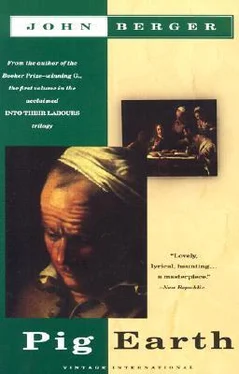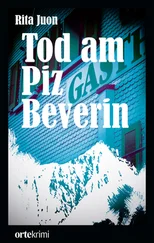We can’t survive another night here, said the chief inspector gravely. This is a form of torture to which you are subjecting us, you realise that, don’t you?
That’s why I brought the sheep. My grandmother used to say: It saves wood to sleep in the stable. She came from the other side of the mountains where there is no forest and wood is scarce.
We shivered all night, the young one said.
Tonight the sheep will warm you.
My colleague needs a doctor. He suffers from an ulcer, and has acute pains in his stomach.
There’s bread and milk for you.
What are you going to do with us?
When you’re ready to listen I’m going to talk.
Talk?
About justice.
Justice! yelled the chief inspector. The sheep turned their heads and looked at him with startled eyes. You are going to talk about justice! You’ll soon be fleeing from justice!
The sheep kept turning in circles looking for a way out, and finding only the walls and the legs of the two seated prisoners. One of the sheep raised her tail to piss. Marcel, standing on the outside staircase, straightened his back so that his head was no longer visible from the inside of the room. It was as if the two men had already been left alone with the sheep and the fact that they were herded so closely together with these animals made their isolation sharper.
You are right, said the older inspector. Why not talk?
Marcel heard the remark but did not put his head back through the door.
Tell me, the inspector went on, how much are you asking for us? You may be asking an unrealistic sum — in which case we could help you.
Marcel bent his knees and looked again at his prisoners.
If you are asking a billion, it’s too much. They won’t pay that for us. Are you in touch with our families or the Ministry?
Marcel gave no sign of having heard the question.
We have a right to know. How much are you asking? Is it more than fifty million? I’d say fifty million is the maximum one could expect them to pay for men like us.
Despair, irreversible as the sound of an avalanche, suddenly engulfed Marcel.
If I’m asking too much, he spoke with his mouth almost shut, why do you care?
We are both married men with children. We are worried for our families.
Once again Marcel appeared not to have heard.
How much are you asking? insisted the chief inspector. You must understand that we have more experience than you of the value of money.
Marcel thrust his fists into the fleece of the nearest sheep and spoke as though to the animal. The value of money! he cried. The value of money!
The other three sheep raised their heads towards the wailing figure in the doorway and started to bleat. The value of money! The value of money! He grasped at the wool.
Slowly his fists relaxed. The sheep quietened. He looked at his two prisoners and spoke.
You are worried, he said. I regret to have to tell you that there is a tax to pay on worry! There’s also a tax to pay on pain and a tax on shivering. A thousand francs a shiver! You say you both shivered all night? If only one of you had stayed warm, it would have saved you money! Still, tonight the sheep will save you hundreds of thousands. Last night, though, you are obliged to pay for! Have you filled in the form for your pain? You spoke of an ulcer, that’s a sharp pain, and the sharper the pain, the higher the tax!
He has gone mad! The younger inspector took hold of the chief inspector’s shoulders and began to shake him. Do something quick, he’s gone out of his mind.
The chief inspector drew out his wallet and threw it over the backs of the sheep towards the peasant.
The wallet lay on the top step. Marcel put his boot on it, and turning his foot, pressed it, as if killing a salamander. Then he left without uttering a word.
He did not ride in the cart. He walked beside Gui-Gui. Walking is a form of thinking. After ten minutes he said to the horse:
It ends in defeat because you can only take revenge on those who are your own. Those two up there belong to another time. They are our prisoners and yet no revenge is possible. They would never know what we were avenging.
Next morning after he and Nicole had milked the cows, he stayed alone in the stable, as he did every morning, to brush and groom the animals until their haunches shone like polished walnut wood. Then he harnessed Gui-Gui to the cart and returned to the grenier.
The prisoners made no attempt to leave when he picked up a sheep and, leaving the door open, carried her away on his shoulders.
Why don’t you go?
You have a gun.
I’m releasing you.
Why? asked the chief inspector suspiciously.
You do not have to know that too.
Backs bent to pass through the tiny door, the two men stepped outside and shielded their eyes with their hands from the sunshine coming off the snow. Their clothes were filthy. Their faces were creased and unshaven. They stood there, uncertain what to do next.
When the police handcuffed Marcel that afternoon the sky was blue and cloudless, the blue extending far beyond the furthest mountain. The snow on the peaks looked as innocent of the past as a baby after sleep.
He was charged with rebellion against officers of the state, armed robbery and the wilful destruction of public property. He served two months’ preventive detention and, at his trial, was sentenced to two years’ imprisonment.
In the prison at B … he looked at his hands which lay idle and heavy in his lap. What has been taken away from me, he said, is the habit of working. I will never again be able to load thirteen tipcarts and take Gui-Gui to the top field.
The flowers in her hair
wet in the morning
are dry by ten
Her apron clings
stones like hands
press in her pocket
Tomorrow
the scythes will gasp
as her clothes fall down
On this slope she’ll lie
hands on its shoulder
feet on the road below
Gathered in lines
her cocks will crouch
like couples in the moonlight
Next day in the sun
she’ll walk on her hands
to get as dry as fire
Combed by the women
lifted by men
she’ll ride the carts
Front wheels locked
with a pole through their spokes
I’ll take her down
And when I pack her
second wife under my roof
my sweat will blind me.
The Three Lives of Lucie Cabrol
THE COCADRILLE WAS BORN in 1900 in the month of September. White cloud, like smoke, was blowing through the open door of the stable. Marius Cabrol was milking. His wife, Mélanie, was in bed, on the other side of the stable wall, attended by her sister and a neighbour. Their first child had been a boy, christened Emile. Marius, the father, hoped that the second would also be a son. He would be named Henri after his grandfather.
The Cabrol farm is on a slope above the village which is called Brine. On the south side of the house the ground flattens out and there are plum trees and a quince. Beside the house is a stream which Henri, the grandfather, channelled to drive a saw. If a log started to roll from up there, it wouldn’t stop till it reached the church. I like to think of the logs I have rolled from high up! If the log is not straight, it leaps like an animal. You watch it from above and it is like an animal galloping. Gradually as the slope levels out, it slows down. When you expect it to lie still, it leaps again. It takes a long time for the flat ground to kill a rolling log.
On the bed Mélanie gripped the headboard. The water was already boiling on the stove in the kitchen. The baby was born very quickly. When I think of her being born, my mind wanders and I see her fishing. She was fourteen and I was three years older. She walked upstream, watching both banks. When she prodded with a stick under a stone, two dark shadows slipped across the river to the other bank. From that moment onwards she never shifted her gaze. She tucked her skirt into its own waist-band and without looking down for an instant she waded across. There she stood absolutely still. The water flowing round her thighs made the same noise as it does flowing round two small stationary rocks. One of the trout left the overhanging bank and darted under a boulder. Was it because she was so small that she was so quick? Or was it because, being blind to warnings, she could read signs which are lost on others? Frisking under the boulder, she trapped the fish and pressed upwards with all the force of her small hand against the stone. The fish was fixed there like a long tongue. And, like a tongue, it tried to retract itself, reaching back down the throat of the water. It tried to thrust forward out of the throat. It tried to turn on its side. Slowly, never letting up the pressure of her palm, she inserted a tiny finger between tongue and stone and two more fingers between tongue and palm. All this with one hand. The instant he went still, she had him out of the water wedged between her three fingers, two with their backs to him.
Читать дальше












